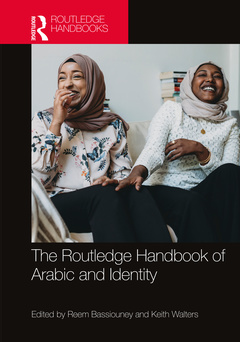The Routledge Handbook of Arabic and Identity
Coordonnateurs : Bassiouney Reem, Walters Keith

The Routledge Handbook of Arabic and Identity offers a comprehensive and up-to-date account of studies that relate the Arabic language in its entirety to identity. This handbook offers new trajectories in understanding language and identity more generally and Arabic and identity in particular.
Split into three parts, covering ?Identity and Variation?, ?Identity and Politics? and ?Identity Globalisation and Diversity?, it is the first of its kind to offer such a perspective on identity, linking the social world to identity construction and including issues pertaining to our current political and social context, including Arabic in the diaspora, Arabic as a minority language, pidgin and creoles, Arabic in the global age, Arabic and new media, Arabic and political discourse.
Scholars and students will find essential theories and methods that relate language to identity in this handbook. It is particularly of interest to scholars and students whose work is related to the Arab world, political science, modern political thought, Islam and social sciences including: general linguistics, sociolinguistics, discourse analysis, anthropological linguistics, anthropology, political science, sociology, psychology, literature media studies and Islamic studies.
Table of Contents
Notes on the Contributors
List of Figures
List of Tables
Acknowledgements
Introduction and Overview
Introduction: The Arabic Language and Identity
Keith Walters
Part I - Identity and Variation
1. From Rajjal to Rayyal: Ideologies and shift among young Bedouins in Qatar
Rizwan Ahmad and Heba Al-Kababji
2. The emergence of a new national linguistic variety in Saudi Arabia: A perceptual dialectology account
Yousef Al-Rojaie
3. Identity and/or acts of identity in light of discourse markers in spoken Arabic
Abdelaadim Bidaoui
4. The expression of rural and urban identities in Arabic
Ahmed Ech-Charfi
5. Optional You and the invocation of shared identity in Levantine Arabic
Youssef Haddad
6. Saudi folks’ attitudes and Pprceptions toward accent switches: The /k/ reflexes across dialects
Manal Ismail
7. Language and identity in post-Revolution Tunisia between authenticity and commodification
Lotfi Sayahi
8. Attitudes to language in the Arab World
Nadia Shalaby
Part II - Identity and Politics
9. Arabic language ideologies: Diglossia
Ashraf Abdelhay and Yasir Suleiman
10. Egyptian identities at times of crisis
Amira Agameya
11. Pan-Arab identity in the post-Arab-Spring Era
Abdulkafi Albirini
12. Arabic and identity in (the conflict-ridden reality in) Israel
Muhammad Amara
13. The discursive construction of Jordanian identity in online discourse
Muhammad Badarneh
14. Erasing Arabic as an entrance ticket to Israeli society: On orientalism, militarism and the Mizrahi option in Israel/Palestine
Yonatan Mendel
Part III - Identity Globalisation and Diversity
15. Language and identity construction in the Arabian Gulf: Challenges faced in a globalized world
Ahmad Al-Issa and Laila S. Dahan
16. Arabic(s) in diaspora: Speakers, usages and contacts
Alexandrine Barontini and Lauren Wagner
17. Complex identities: Arabic in the diaspora
Luca D'Anna & Chiara Amoruso
Index
Reem Bassiouney is a professor (and chair) at the American University in Cairo, Egypt. She has eight linguistics books to her name. She is the author of Functions of Code-Switching in Egypt (2006), Language and Identity in Modern Egypt (2014) and Arabic Sociolinguistics (2009; second edition 2020). Her edited volumes include The Routledge Handbook of Arabic Linguistics (co-editor with Benmamoun) and Identity and Dialect Performance (2017). She is also the editor and founder of the Routledge Studies in Language and Identity series. Bassiouney is also an award-winning novelist.
Keith Walters is Professor Emeritus from the Department of Applied Linguistics at Portland State University, Portland, Oregon, USA. During his career, he also held positions in the English Department at the Ohio State University and the Linguistics Department at the University of Texas–Austin. He has taught English as an additional language in the US, Tunisia, Guinea and the West Bank and helped train teachers in those countries, Morocco, Egypt and Vietnam. His research interests include codeswitching, diglossic switching, language ideologies, and language and nationalism as well as language and the law. An award-winning teacher, Walters is co-author of two widely used composition textbooks, Everything’s an Argument (8th edn) and Everyone’s an Author (3rd edn).
Date de parution : 08-2022
17.4x24.6 cm
Date de parution : 09-2020
17.4x24.6 cm
Disponible chez l'éditeur (délai d'approvisionnement : 14 jours).
Prix indicatif 250,90 €
Ajouter au panierThèmes de The Routledge Handbook of Arabic and Identity :
Mots-clés :
Arabic; Arabic Language; identity and politics; Language Ideology; identity and variation; Bedouin Dialects; Standard Arabic; identity globalisation and diversity; Tunisian Arabic; Jordanian Identity; Young Man; Arab Identity; Language Attitudes; Perceptual Dialectology; Bedouin Variants; Common Language; National Identity; Lingua Franca; Diasporic Communities; Arabic Speakers; Language Ideological Debate; Egyptian Identity; Egyptian National Identity; Global English; Language Anxiety; Moroccan Participants; Hijazi Arabic; Tunisian Community



